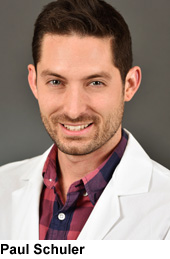In moving from novice to expert, the author didn’t travel alone.

Nursing is a profession based on selflessness and compassion for others. Nurses speak for those who cannot speak for themselves. We strive to protect our patients from an evolving system of care that sometimes seems to focus on quantity over quality. We safeguard the gap between theory and practice.
 As nurses, we admire colleagues who “wrote the book” on the unit and have been there since its inception. Like them, we seek to traverse the span “from novice to expert” as described by Patricia Benner. Experience can be a nurse’s greatest strength, because it augments the way we perceive a situation and apply our fundamental knowledge of care. Yet, we are at its mercy, because experience compels us to utilize traditional practices we know have worked in the past. As a result, we are left wondering if there is a better way.
As nurses, we admire colleagues who “wrote the book” on the unit and have been there since its inception. Like them, we seek to traverse the span “from novice to expert” as described by Patricia Benner. Experience can be a nurse’s greatest strength, because it augments the way we perceive a situation and apply our fundamental knowledge of care. Yet, we are at its mercy, because experience compels us to utilize traditional practices we know have worked in the past. As a result, we are left wondering if there is a better way.
On the shoulders of others
It is imperative that we build upon the knowledge and experience of those who have gone before us. Mentorship provides the perfect mechanism for nurses to transfer centuries of expertise and caring while providing the opportunity to ask, “Can we do better?”
I envy nurses just beginning their careers. They desire to put all their hard-earned knowledge to the test. Little do they know, however, the complexities of the world about to unfold for them.
My journey from novice to expert has been shaped by the persistence and direction of others. It began when I was a new-graduate nurse at Boston Children’s Hospital, where I was instantly intimidated by the wealth of expertise demonstrated by my colleagues in every care situation and nursing intervention. My successful integration into a busy clinical system relied upon the patience and instruction of the nurse assigned to guide my 16-week orientation. It was her duty to instill in me the skills needed to be a safe and effective nurse.
One immediate, obvious truth was that my preceptor was an expert at her craft. I would struggle to grasp what must have seemed to her the most rudimentary of concepts. With every awkward mistake I made, she would not only reorient me to the task at hand but provide constructive feedback. Although I was not experienced enough to fully appreciate her guidance and direction at the time, I later realized that my practice was being infused with her experiential knowledge. She was giving me the tools necessary to navigate what appeared to be an overwhelming system of patient care. My struggle in coping with the deluge of new experiences veiled the simple fact that a preceptor’s role as teacher and tutor can develop into a relationship that is much more meaningful.
It takes time
Reflecting on my early nursing experience is difficult because my own arrogance and inherent quickness to act prevented me from receiving criticism in a useful manner. This, combined with our different communication styles, made for an early dynamic that was, for lack of a better word, challenging. My novelty was magnified by the fact that I was the prototypical millennial nurse who wanted to fix the world in five minutes. We want our café lattes made in 30 seconds, so why would we want to take the time to learn the finer points of preventing central line-associated bloodstream infection? I was fortunate to have a mentor whose perseverance and determination eventually taught me that I had much to learn and that nursing is a profession that takes time to develop.
The simplest definition of mentor is trusted counselor or guide, but more than this, a mentor is someone who takes it upon him- or herself to transfer expertise to others. In my view, the following statement best describes what effective mentors do: They take part in an interpersonal relationship that is mutually beneficial, engaged, and committed.
There is a fundamental difference between preceptorship and mentorship. Preceptorship is a temporary experience designed to ensure that new nurses meet specific educational requirements within an orientation period. Mentorship, however, is an ongoing process of learning that involves an interpersonal dynamic that facilitates an experiential transfer from mentor to mentee. It was not until I entered the dual pediatric primary and acute care nurse practitioner program at Northeastern University that I began to understand the nature of this meaningful relationship.
Eye-based evidence
My final clinical placement was on the general surgical floor at Boston Children’s Hospital. I was assigned to Marie Esposito, MS, CPNP-AC, PNP-BC, a pediatric nurse practitioner who would come to shape my practice as a provider. While momentous and emotionally satisfying, my practicum experience was anything but easy. Our styles of learning and pace of care delivery were extremely disparate. Esposito was old school. She would say: “It doesn’t matter what the numbers may say. Assess the patient with your own eyes!” We embodied generational differences that gave me pause. I come from an era in which data is instantly at my fingertips—where a few keystrokes can access any information. Giving hard numbers a backseat to physical assessment was a far cry from my philosophy of data-driven care.
Esposito demonstrated her mentorship skill by supporting my tendency for speed and efficiency. She helped me overcome my deficiencies by allowing me to make errors and learn from them. She showed me that surgical nursing is not simply responding to what the data reveals. A surgical abdomen can be missed if you consider only vital signs. An effective advanced practice nurse assesses the whole patient by interpreting numerical data in the context of the patient’s symptoms and trajectory. This is the beauty of mentorship in nursing. It creates a medium not only for transferring experiential knowledge, but for shaping practice by sharing ideas through meaningful relationships.
Full circle
My mentorship journey has come full circle as part of the Doctor of Nursing Practice (DNP) program at Northeastern University. Director Michelle Beauchesne, DNSc, RN, CPNP, FAAN, FAANP, FNAP, encouraged me to ask the hard question, “Can we as nurses do better?” As patient advocates, we have a duty to constantly evaluate practice. How does one handle evidence that contradicts what experience tells us?
Evidence-based practice (EBP) is a problem-solving method that combines best evidence and clinical expertise with patient preferences and values to inform clinical decision-making. This process maximizes patient outcomes by allowing bedside nurses to reconcile experience with evidence. In the context of a busy clinical environment, mentorship offers an ideal opportunity for questioning current nursing practices.
This became evident to me in 2015 when I joined the Evidence-Based Practice Subcommittee at Boston Children’s Hospital. I was surrounded by expert nurses looking for creative ways to build and sustain an institutional culture of EBP. Drawing upon my own complicated experience with mentorship, I offered it as a solution—nurses mentoring other nurses to create a self-sustaining pool of EBP experts. In an unexpected twist of fate, this action placed me back into the mentee role once more.
The cycle continues
Although well-versed in the subtleties of mentor-mentee dynamics, I had little experience with formal curriculum development. Michele DeGrazia, PhD, RN, NNP-BC, FAAN, a Boston Children’s Hospital nurse scientist and neonatal nurse practitioner, encouraged me to use my mentoring experience as a foundation to conceptually develop the Evidence-Based Practice Mentorship Program, or EBPMP. This novel, self-directed immersion program is designed to prepare nurses to conduct EBP projects that address important clinical practice questions in their work environments. Participants receive mentorship from internal EBP experts to evaluate current evidence related to their clinical practice questions. They then synthesize this evidence into a clinical-practice recommendation and disseminate their findings. At program’s end, mentees have the opportunity to serve as mentors for future cohorts, and so the cycle continues.
While EBP is vital to optimizing patient outcomes, mentorship is the key to its implementation and sustainability. It provides a conduit for nurses to self-reflect on experiences instilled in them through the guidance of others. Throughout my career, I have been fortunate enough to be surrounded by mentors such as Beauchesne and DeGrazia who have nurtured my strengths and weaknesses. They embody the defining mentoring quality of challenging one’s preconceptions to foster an exchange of ideas. They did not simply impart experiential knowledge but encouraged me to succeed. They gave me the skills needed to accomplish things I never thought possible, such as helping to create EBPMP.
Mentorship is a humbling concept. No matter how advanced our nursing practice is, we find ourselves moving back and forth between the mentee and mentor role because of the breadth of our profession. While nurses of the next generation will, before knowing a question exists, believe they have the answer, mentors will be needed to challenge them and empower them with necessary tools, such as evidence-based practice. My nursing practice, which is ever-changing, has been shaped by those who came before me. I hope to leave behind a legacy for my mentees that gives them the knowledge, skills, confidence, and courage needed to lead the change.
Paul D. Schuler, DNP, RN, CPNP-PC/AC, is an acute care pediatric nurse practitioner in the medical-surgical intensive care unit at Boston Children’s Hospital in Boston, Massachusetts, USA. Currently serving as chair of the Evidence-Based Practice Subcommittee at Boston Children’s Hospital, he plays a lead role in developing the hospital’s Evidence-Based Practice Mentorship Program. He graduated from Northeastern University’s Doctor of Nursing Practice program in May.
Editor’s note: Paul Schuler will present “Evaluation of a Novel Evidence-Based Practice Mentorship Program in a Pediatric Quaternary Care Setting” on Friday, 28 July, at the 28th International Nursing Research Congress in Dublin, Ireland. Schuler's presentation is in Session 1 of Rising Stars of Research and Scholarship Invited Student Posters. See the Virginia Henderson Global Nursing e-Repository for additional information.
Other articles in this series